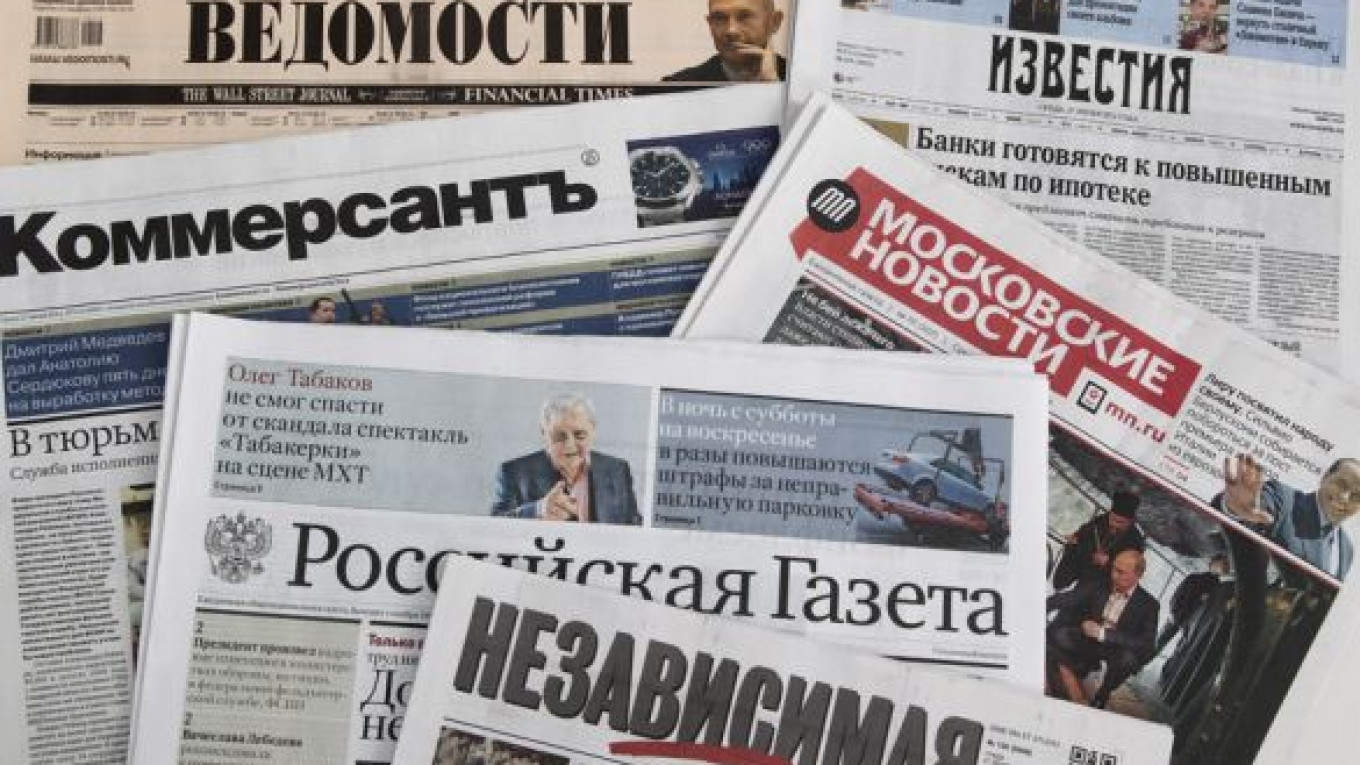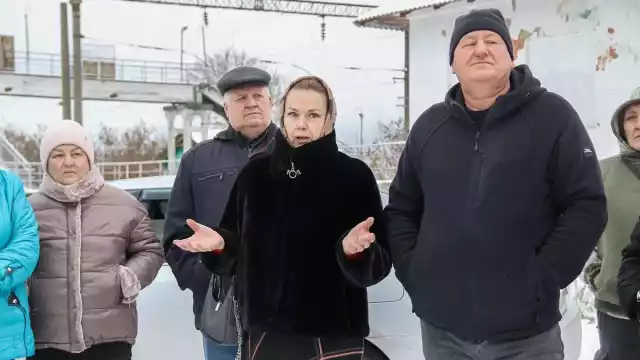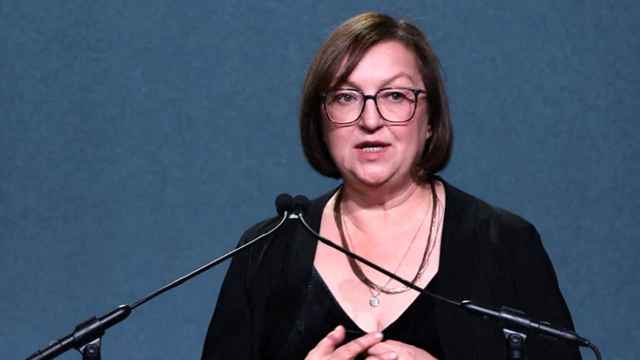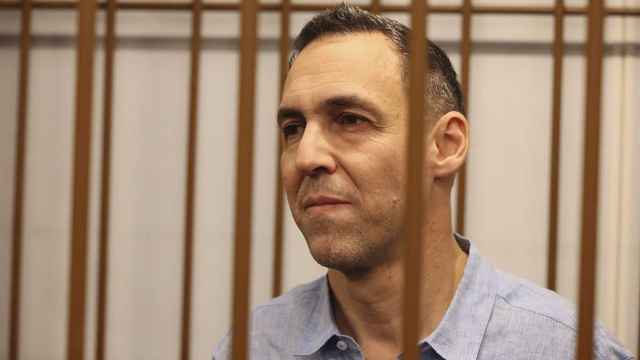Kommersant
1. Sofya Samokhina et al. article headlined "State of complex subordination" elaborates on the progress of the reform of the Russian Academy of Sciences and, in particular, on the setting up of new administrative bodies for managing the assets of the academy; pp 1, 5 (906 words).
2. Oleg Rubnikovich article headlined "Heritage buildings torn down because of case" gives details of a fraud case involving former head of the Moscow directorate of the Federal Agency for the Management of State Property Anatoly Shesteryuk; pp 1, 6 (603 words).
3. Anna Balashova report "Fourth generation driven to villages" says that the Communications and Press Ministry will oblige mobile phone operators to pay for a right to develop LTE in GSM (2G) frequencies; pp 1, 12 (550 words).
4. Maxim Ivanov article headlined "Vladimir Putin to announce and explain in December" says President Vladimir Putin's annual state-of-the-nation address is to be delivered in December; experts mull over possible contents of the address; p 2 (494 words).
5. Ivan Safronov and Yelena Kiseleva article headlined "Sergei Shoigu conquering Latin America" previews the visit of Russian Defense Minister Sergei Shoigu to Brazil and Peru next week to sell Russian-made armaments; p 2 (608 words).
6. Natalya Gorodetskaya article headlined "Finance Ministry kicks lawmakers out of VIP lounges" says the Finance Ministry has refused to back Russian lawmakers' bill for using VIP lounges at airports, arguing that official delegations halls should be enough for them; p 2 (550 words).
7. Anna Pushkarskaya article headlined "Staff selection behind the scenes" says the State Duma has started hastily considering a judicial reform proposed by Putin that provides for the merger of the Supreme Court and the Supreme Arbitration Court. Former Moscow region prosecutor Alexander Anikin has been tasked with selecting candidates for judges for the new establishment; p 2 (640 words).
8. Vyacheslav Kozlov article headlined "Bolotnaya square unrest case defendant prescribed with punishment" reports on the verdict in the case of Mikhail Kosenko, who has been sentenced to compulsory psychiatric treatment; p 3 (533 words).
9. Grigory Tumanov article headlined "Court does not back off" says Greenpeace activists and Russian photographer Denis Sinyakov are to be remanded in custody for two months pending trial in connection with their attempted attack on the Prirazlomnaya oil platform; p 3 (538 words).
10. Irina Nagornykh article headlined "Removal campaign" says that Kremlin policy makers are apparently determined to get the so-called "non-systemic" opposition more involved in the political process through elections rather than through street protests; p 4 (1,024 words).
11. Kommersant deputy editor in chief Gleb Cherkasov comments in the "Price of Issue" column on the change in the Kremlin's policy on the opposition; p 4 (490 words).
12. Irina Nagornykh interview with pundit Oleg Matveychev, who comments on the Kremlin's new strategy to enter into dialogue with the non-systemic opposition; p 4 (521 words).
13. Irina Nagornykh interview with Irina Khakamada on the steps the Kremlin is taking to incorporate the non-systemic opposition into the existing political structure; p 4 (517 words).
14. Anton Arsenyev article headlined "British diplomas suffer from change of layout" says a St. Petersburg court of arbitration has started hearing a lawsuit of Secretary of State for Foreign and Commonwealth Affairs of the U.K. William Hague, who wants the city's central district administration to approve a change in the layout in several flats owned by the Foreign Office. If found in violation of the heritage protection legislation, the Foreign Office might have to pay a hefty fine; p 5 (467 words).
15. Pavel Tarasenko interview with Peter Maurer, president of the International Committee of the Red Cross, on the latter's meeting with Putin and the Red Cross's help to Syria; p 7 (613 words).
16. Pavel Tarasenko article headlined "British lobbyists tied with Laborists" looks ahead at today's voting in the House of Commons on the heavily criticized Lobbying bill; p 7 (408 words).
17. Sergei Strokan and Yelena Chernenko article headlined "Syrian chemical weapons sent under saw" says UN Secretary-General Ban Ki-moon has outlined a programme for the destruction of Syrian chemical weapons. Russia is seeking maximum involvement of its experts in the mission; p 7 (613 words).
18. Dmitry Butrin article headlined "Russia does not fit in non-standard" reports on the start of the IMF autumn session; Russia with its "standard" monetary policy is not high on the agenda; p 8 (645 words).
19. Yury Barsukov article headlined "Gazprom offers demonstrative discount" says Gazprom's discount on its gas price for Ukraine is bound to improve relations between the two countries, but the company will see its revenues sink by $700 million; p 9 (650 words).
20. Petr Netreba article headlined "State programmes to be cleaned out twice" says the Finance Ministry and the Economic Development Ministry are going to review the government's infrastructure programs in a move to cut public spending; p 8 (487 words).
21. Tatyana Yedovina article headlined "APEC acquires trade blocs" looks at the APEC summit and says that Russia, the U.S. and China will monitor the freedom of trade in the region; p 8 (650 words).
Vedomosti
1. Yekaterina Kravchenko article headlined "Russia like China" says that according to the IMF forecast, the Russian and Chinese economies are set to slow down as their growth potential has exhausted; p 5 (373 words).
2. Editorial headlined "Intimidation logic" comments on the guilty verdict in the case of Mikhail Kosenko and says the authorities have discredited themselves by making it clear to the public that the Bolotnaya square defendants are innocent; p 6 (346 words).
3. Sergei Titov and Maxim Tovkaylo article headlined "400Bln Rubles or go to jail" says the Finance Ministry intends to toughen penalties for businesses paying under the table; p 4 (630 words).
4. Editor of the Dozhd TV website Ilya Klishin article headlined "Hysteria as Kremlin's tool" says the Russian authorities have apparently mastered social networking tools such as Facebook and Twitter and have been using them successfully to channel public opinion during election campaigns; p 7 (423 words).
5. Polina Khimshiashvili and Lilia Biryukova article headlined "Putin shows ways for Asia" says at the APEC summit in Indonesia, Putin has sought to persuade the heads of the Asian countries, China in the first place, to invest in Russia and pledged better conditions for business; p 3 (414 words).
6. Margarita Lyutova article headlined "Innovation at the expense of future" says the Finance Ministry considers tapping into the National Welfare Fund as a source of investment for promising high-tech projects; p 4 (567 words).
7. Editorial headlined "Visa deadlock" says that Putin has spoken against the introduction of visas for citizens of the CIS despite a wide public support for this idea in Russian society. The newspaper points to a contradiction between the Kremlin's domestic policy that encourages xenophobia and its international policy; pp 1, 6 (367 words).
Nezavisimaya Gazeta
1. Alexandra Samarina article headlined "Crimes without punishment" says next week the Federal Marshals Service is to deliver a performance report to the Prosecutor General's Office on the enforcement of court rulings. The marshals service has little to boast about as in Moscow, for example, 80 percent of court rulings remain unexecuted; pp 1, 3 (1,603 words).
2. Sergei Kulikov article headlined "People refuse to pay for utilities" says a sluggish economy has brought about an increase in utility arrears, with the debts now exceeding $4.7 billion; pp 1, 5 (879 words).
3. Tatyana Ivzhenko article headlined "Naftohaz faces bankruptcy" says that Naftohaz, Gazprom's gas transportation partner in Ukraine, may face bankruptcy because it has been failing to recover the money owned by gas resellers; pp 1, 7 (1,067 words).
4. Viktor Litovkin article headlined "Secret of RS-26 missile" assumes that Russia's new RS-26 ICBM was earlier referred to as Rubezh and is likely to enter service as from 2014. The missile has been successfully tested and qualifies as a high-precision weapon; pp 1, 9 (1,039 words).
5. Editorial headlined "Beijing pushing out Washington from Asian markets" says US President Barack Obama, who has had to cancel his attendance at the APEC summit and visits to the Philippines and Malaysia, missed a chance of implementing his declared policy of closer cooperation with Asian countries amid the growing influence of China in the region; p 2 (552 words).
6. Alexei Gorbachev article headlined "Forcibly and indefinitely" reports on Mikhail Kosenko's trial at Moscow's Zamoskvoretsky District Court that has found him guilty of staging unrest during the Bolotnaya square protest and sentenced him to compulsory psychiatric treatment. The ruling sends an "unpleasant" signal to other defendants in the case, the author says; p 2 (531 words).
7. Savely Vezhin article headlined "He can" says that Sergei Mironov is predictably going to regain chairmanship in the A Just Russia party; p 3 (529 words).
8. Vladimir Kotlyar op-ed in the "Carte Blanche" column headlined "Piracy or criminal irresponsibility?" insists that the Greenpeace activists, who have been arrested for attacking the Prirazlomnaya oil platform, did break the law, but there are no grounds for charging them with piracy, unless investigators establish that the campaign was sponsored by Gazprom's rivals or Chechen terrorists; p 3 (734 words).
9. Viktor Litovkin article headlined "Qabala being pulled into tourism business" says Azerbaijan is mulling over the most unlikely ways to re-purpose the Qabala radar station that was used by the Russian army, but had to be abandoned after a rent hike; p 4 (1,044 words).
10. Anastasia Bashkatova article headlined "Three-year budget risk" says the Russian government may have to seriously reconsider its spending plans as the economy is stumbling; p 5 (1,021 words).
11. Grigory Mikhaylov article headlined "Gold being divided at Issyk Kul" says the visit of Russian State Duma speaker Sergei Naryshkin to Kyrgyzstan has passed almost unnoticed amid protests in Karakol; p 7 (656 words).
12. Sergei Nikolsky essay headlined "After empire" looks at how Russian people came to perceive their country as an empire; p 10 (5,576 words).
13. Dmitry Litovkin article headlined "Generation 'five minus'" looks at the range of new aircraft that are to be supplied to the Russian Air Force by 2020; p 9 (745 words).
14. Yevgenia Novikova article headlined "Putin calls Holland to account" reports on an incident involving Russian diplomat Dmitry Borodin in the Netherlands; p 8 (504 words).
15. Yury Panyev report "Hundred experts to disarm Syria" says that on Oct. 10 the UN Security Council will discuss the UN secretary-general's initiative to set up a joint mission with the Organization for the Prohibition of Chemical Weapons in Syria; p 8 (650 words).
Rossiiskaya Gazeta
1. Kira Latukhina article headlined "Balinese gifts" summarizes President Vladimir Putin's news conference on the second and final day of the APEC summit on the island of Bali; p 2 (963 words).
2. Yulia Krivoshapko interview with Armen Khanyan, head of the directorate for control over foreign investment at the Federal Antimonopoly Service (FAS) headlined "FAS casts net". Khanyan describes the schemes that foreign fishing companies have been using to get access to Russian fisheries and what is being done to put them under control; p 5 (760 words).
3. Fedor Lukyanov article headlined "Changes on Iranian front?" points to the growing likelihood of a rapprochement between the U.S. and Iran; p 8 (719 words).
4. Vladislav Vorobyov article headlined "Hitting Vienna convention with club" sees a link between the mistreatment of Russian diplomat Dmitry Borodin in the Netherlands and the criminal case against Greenpeace activists who attempted to stage a protest at the Prirazlomnaya oil platform; p 8 (513 words).
5. Mikhail Barshchevsky interview with the president of the Russian Olympic committee, Alexander Zhukov; p 17 (2,900 words).
Izvestia
1. Kirill Yakovenko report "Officials recount capital flight in autumn" says that Russian officials are gradually reconsidering their assessment of the country's economic indices; pp 1-2 (500 words).
2. Lyudmila Podobedova report "Dagestani utilities companies want to replace Gazprom with Rosneft" says that Dagestan's housing and utilities companies, to whom Gazprom has cut gas supplies over debts, want to decline the services of the gas giant; pp 1, 4 (600 words).
3. Yelizaveta Mayetnaya interview with psychiatry expert Yury Savenko who speaks on the verdict to Mikhail Kosenko, a defendant in the Bolotnaya mass unrest trial, who has been sentenced to compulsory psychiatric treatment; pp 1, 3 (800 words).
4. Yegor Sozayev-Guryev report "Vladimir Putin discusses disarmament of Syria" looks at Putin's statements made at the APEC summit in Bali; p 2 (650 words).
5. Tatyana Baykova article headlined "Muslim Brotherhood accuses military of contacts with Israel" looks at the situation in Egypt and features comments of Russian experts; p 7 (650 words).
6. Darya Tsoy report "Netherlands may apologize for incident with Russian diplomat" looks at the incident in the Netherlands where a Russian diplomat has been beaten up; p 7 (600 words).
7. Viktor Osipov report "Art of gratitude" says that graffiti depicting Putin has appeared in the streets of some European cities; p 9 (750 words).
8. Kirill Benediktov report "Leaders and losers" comments on the budget crisis in the USA; p 9 (1,000 words).
Moskovsky Komsomolets
1. Viktoria Prikhodko report "Vladimir Putin to MK: 'Meeting Obama for sake of meeting not needed'" says that at the APEC summit, Putin has answered the newspaper correspondent's question about Russian-U.S. relations. Putin also spoke about what he had discussed with U.S. Secretary of State John Kerry; pp 1-2 (600 words).
2. Mikhail Rostovsky report "Say word bout poor minister, or what Igor Shuvalov is not right about" looks at the interview of First Deputy Prime Minister Igor Shuvalov with the radio station Vesti FM; pp 1-2 (500 words).
3. Mikhail Delyagin report "Do not laugh at uncle Sam" comments on the economic situation in the U.S.; p 3 (900 words).
RBC Daily
1. Alexander Litoy article headlined "Recipe from Bolotnaya" says a guilty verdict has been passed on the Bolotnaya case defendant Mikhail Kosenko, who was sentenced to compulsory treatment; p 1 (250 words).
2. Alexander Litoy interview with the class mate of Mikhail Kosenko, human rights activist Oleg Novikov, who comments on Kosenko's guilty verdict; p 2 (700 words).
3. Stepan Opalev article headlined "12 cases found for Vasilyeva" lists 10 most high-profile corruption cases that have been covered by the media recently; p 2 (350 words).
4. Yulia Yakovleva article headlined "Unnatural selection" says that A Just Russia party members of the Yekaterinburg city duma doubt the transparency of the upcoming election of the city manager and demand that the commission, which is to choose a nominee for the post, be changed; p 2 (700 words).
5. Inga Vorobyova article headlined "Putin shown dolce vita at Bali" looks into the results of the APEC summit in Indonesia; p 3 (600 words).
Noviye Izvestia
1. Olga Goncharova article headlined "They did not take million" says that despite the request of defense to release on bail photographer Denis Sinyakov, doctor Yekaterina Zaspa and Greenpeace press secretary Andrei Allakhverdov, who are charged with piracy in the Greenpeace case, the court has confirmed their arrests; pp 1, 5 (250 words).
2. Yulia Savina article headlined "No more 'meeting for purpose of meeting'" looks into the statements made by Vladimir Putin at the APEC summit in Indonesia; p 2 (500 words).
3. Yekaterina Dyatlovskaya article headlined "They sound assembly" says that 570 people have joined opposition leader Alexei Navalny's new project "People's deputy", which will allow to introduce drafts of laws to the Moscow City Duma. Experts say Moscow City Duma deputies should pay attention to the initiative; p 2 (550words).
4. Alexei Mukhin article headlined "To understand and to forgive costs a fortune" says that developments in Russian regions are gaining increasing attention on the federal scale, therefore the regional governors are growing in importance; p 2 (700 words).
Novaya Gazeta
1. Andrei Kolesnikov and Alexei Polukhin interview with former Finance Minister, head of the Civil Initiatives Committee Alexei Kudrin on the prospects of the Russian economic development; pp 2-4 (2,600 words).
2. Yulia Polukhina article headlined "Court closed eyes but listened" says that the court has ignored all the facts, fotos and videos demonstrating Bolotnaya case defendant Mikhail Kosenko's innocence and still passed a guilty verdict on him; p 10 (600 words).
Komsomolskaya Pravda
1. Valentin Kulyavtsev article headlined "Sergei Ivanov: 'Far East needs breakthrough'" looks into the visit of head of the presidential administration Sergei Ivanov to the flooded areas in Russia's Far East; p 4 (500 words).
2. Alexander Grishin article headlined "Getting closer to European Union worse than end of world for Moldavia" features pundits' comments on Moldavia's willingness to join the EU, saying it "contradicts the common sense"; p 7 (1,500 words).
Argumenty I Fakty
1. Vitaly Tseplyaev interview with pundit Mikhail Leontyev on Russia's role in settling the Syrian conflict; p 11 (1,500 words).
A Message from The Moscow Times:
Dear readers,
We are facing unprecedented challenges. Russia's Prosecutor General's Office has designated The Moscow Times as an "undesirable" organization, criminalizing our work and putting our staff at risk of prosecution. This follows our earlier unjust labeling as a "foreign agent."
These actions are direct attempts to silence independent journalism in Russia. The authorities claim our work "discredits the decisions of the Russian leadership." We see things differently: we strive to provide accurate, unbiased reporting on Russia.
We, the journalists of The Moscow Times, refuse to be silenced. But to continue our work, we need your help.
Your support, no matter how small, makes a world of difference. If you can, please support us monthly starting from just $2. It's quick to set up, and every contribution makes a significant impact.
By supporting The Moscow Times, you're defending open, independent journalism in the face of repression. Thank you for standing with us.
Remind me later.






